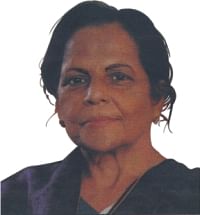Lest We Forget
Begum Noor Jehan Murshid
Tazeen M. Murshid
SHE was a ray of sunshine and the centre of our universe. Ever patient and understanding, she was aware of all our needs, even before we could articulate them. She watched over us like a tigress protecting her young, but allowed us space to mature, make decisions, take responsibility for our actions, and thus keep us from rebelling excessively against parental authority. She nurtured us lovingly to be creative and to give of ourselves to society and our country. She passed on to us her values of tolerance, devotion and fortitude, steeped as she was in Tagore, Atul Prasad, Nazrul and Plato. My mother, Noor Jehan Murshid, born on 22 May 1925, in the Murshidabad district of West Bengal, passed away in September 2003. It seems so long ago and yet so recent. Memories of her optimism, her ever cheerful smile, her sense of fairness, her serene beauty and warm presence, which had surrounded us in our matter of fact world, though remote today, continue to glow for us, and bring us a glimmer of hope. We take strength in what she stood for, and what she believed in: for against all the odds, the incurable optimist in her believed that a sane society will prevail in Bangladesh. When asked to account for her optimism, she would simply answer that one cannot live without optimism; for in optimism lies hope and the vision of a better life. And in this vision lies the means by which that better life can be realised. Whenever the going gets tough, I remember this life-enhancing motto. Today, as the national and political landscape is marred by blood, gore and scandal, with every possibility of mounting violence as the next general elections draw near, I look for signs of optimism and hope. Previously, I had found it in the micro-credit revolution, and in rising female participation in national life. Now I look for it in the pool of common sense that our people possess. My mother, I think would have done the same. For a woman of her times, and even mine, her achievements are worth recalling: She obtained her Master's degree from Calcutta University; was superintendent of Munnujan Hostel during the terrible times of the 1946 Great Calcutta Killings, which she survived quite miraculously due to assistance from Shahid Suhrawardy and Abul Hashim. She was a member of the Legislative Assembly in 1954 under the United Front government, being one of two women to win in direct elections. She addressed the Joint Session of the Indian Lok Sabha and the Rajya Sabha in 1971 to raise support for the liberation of Bangladesh, an appeal which many found deeply moving. She was in the Awami League cabinet in the 1970s as a State Minister for Social Welfare. She was the first Bengali Muslim lady to act on stage in the newly independent East Pakistan opposite the late Munier Chowdhury, who was assassinated in 1971 by the al-Badr. But her greatest achievement was the journal she published from 1985 to 1991, Edesh Ekal, which reflects her developing mind, and her thoughts about the problems of women in society. Today, I remember her with a greater sense of loss, as the moment of her departure three years ago, draws nearer. In reflecting on her life and contributions, I reflect on mine: how far has the apple fallen from the tree? Tazeen M. Murshid is Assoc Prof, International Politics, Universite Libre de Bruxelles, Email: [email protected].
|

|